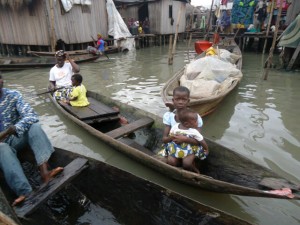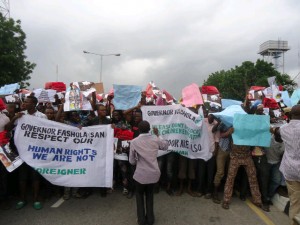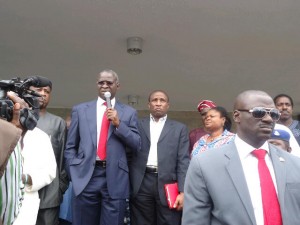
Environmental science writer, Tina Armstrong-Ogbonna, relates her experience as the controversial Makoko demolition saga unfolded in Lagos
I recently participated in the filming of a documentary on flooding and erosion in Lagos State sponsored by a non-governmental organisation. The focus of the documentary in Lagos was to highlight people, places and communities adversely affected by flooding and erosion. The first of the shootings featured residents of the Makoko waterfront community were protesting against the forceful eviction and demolition of their homes by the state government. We decided to include this in the documentary and followed the protesters from the Government House in Alausa, Ikeja, where Governor Babatunde Fashola addressed the Makoko community. On the 16th of July, the demolition of the lagoon-side settlement commenced after a 72-hour eviction notice was given to the community.
When I received a call on Saturday 14th July of the notice and looming eviction, I set out to do a story reminding Lagosians how, some 22 years ago, slum settlement Maroko was demolished and the area converted to choice property for the rich. I was able to contact a youth leader and teacher in the only school In Makoko. Noah Shemede, a young, intelligent and vibrant-looking youth, explained the plight of his people to me. According to Shemede, their homes, livelihood and heritage are at risk of being lost. True to the words of the state government, officials went ahead with the first phase of demolition that lead to the killing of a community leader.
On the day of the protest against the eviction and subsequent killing of the Makoko leader, the people in their hundreds marched peacefully but angrily to the Alausa Government House. As I marched along and spoke with some of them, I saw – and felt – fear and dashed hopes visibly written on the peoples’ faces.

A teacher in the community, Princess Loveffans Alfredo-Durugo, told me how the children she teaches who are mainly from poor homes would be further devastated by this eviction. Alfredo- Durugo noted that her love for the children led to her commitment to teaching the children who pay their little teaching fee daily.
“Their parents are not educated but they want their children to be educated and that is why they sent them to school. And now Governor Fashola wants to shatter the dreams of these bright and prospective leaders. Can’t the poor live in this Lagos?” she asked me.
I was moved by this simply question but I had no answer for her. Among the protesters were female fish sellers. These women explained to me that the bulk of dried fish eaten by Lagos residents come from Makoko.
“Our men fish in the water and we process the fish which we sell to Lagosians,” she said. “Governor Fashola is talking about mega city but don’t want the poor in the megacity. Before the general election in 2011, they came to us to campaign for votes but did not tell us then that we are foreigners, miscreants and thieves. Now that the governor has succeeded in winning election into office for the second term, he is now using our votes against us.”
An Ilaje businesswoman in Makoko, Stella Sohe, also told her story.
Her words: “I am 46 years and was born in this Makoko and my parents are late. My husband married me in this place and my first daughter is also married but stays in Okokomaiko with her husband. Where does Fashola want me to go because my parents never told me we have land anywhere. Aunty (addressing me), will you ask Fashola where he wants me and my family to stay? This is wickedness.”
While addressing the protesting residents at the government house, Governor Fashola pointed out that certain quarters were taking advantage of the Makoko people and situation to make money by collecting grants on their behalf without the money getting to the people. He was apparently referring to civil society organisations.

He explained to them that he had their interest at heart, that some illegal immigrants were living with them, and that the continuous expansion of shanties on the water front would not be tolerated.
According to Fashola, the Lagos Lagoon is the only natural drainage that serves the city and the continuous expansion of the shanties is reducing the size of the lagoon and does not befit the megacity status of the state. He said his administration is working on improving the aesthetic view of the Makoko water front to make it the Venice of Africa.
Well, if the governor is saying that homes in Makoko are shrinking the Lagos Lagoon which is the major drainage that serves the state, what about the on-going Eko Atlantic City that is being built on the Lagos coastline and is expected to accommodate 250,000 persons? Is it not also shrinking the Atlantic Ocean that also drains neighbouring communities in the state?
The governor requested a meeting with representatives of the community leaders for further consultations. But Felix Morka of the Social and Economic Rights Action Centre (SERAC) alleges that a senior government official had once told him that government was committed to the destruction of the Makoko and that government had no intention of compensating or resettling the evictees. According to Morka, the official pointed out that Makoko residents are not indigenes of Lagos State and that they should return to their states of origin. Morka said government’s decision to demolish Makoko implies pushing the poor deeper into poverty but seizing their lands in favour of the rich and powerful in the society, a situation he tagged economic violence and a recipe for urban strife.
Makoko is well documented and globally recognised as an ancestral fishing settlement that has flourished since the 1860s. It comprises predominantly of Yorubas, Eguns, Ilajes and Ijaws, whose lifestyles, occupation, culture and identity are intricately connected to access and use of open water for fishing and transportation of wood from the hinterland to Lagos.
The people of Makoko have co-existed peacefully despite the community’s ethnic and religious diversity. Its domestic economy is equally vibrant as over 40 percent of all smoked fished consumed in Lagos is processed in the community. The tourist potential of Makoko is immense and can be harnessed through thoughtful and participatory planning.
Some 22 years ago, a poor urban clustered community called Maroko was demolished by the then Lagos Military Administration and the residents were never relocated nor compensated. But the area was converted to a choice property location for the rich, called Victoria Island Extension.
Environmental lawyer and lecturer at the Nigeria Institute of Advanced Legal Studies, Professor Lanre Fagbohun, said it is shameful that such a development was re-occurring in a democratic government. He stressed that the Makoko evictees would increase the number of homeless people in Lagos and that there could be a rise in the wave of insecurity in the state since their source of livelihood has also been taken from them.
One of the United Nation Millennium Development Goal is reduction of extreme poverty and hunger by the year 2015. How would Lagos the economic capital of Nigeria and Africa most populous nation, help in achieving this target since the residents of the Makoko water front are indispensable in providing fish consumed in the state? Would this not affect the food security of the over fifteen million residents in the State? The question most residents of Lagos are asking is, can’t Lagos attain its megacity status without the eviction and demolition of the Makoko water front community, and since there are other infrastructural development that the State Government should be more concerned with that can improve the status and lives of the people?
